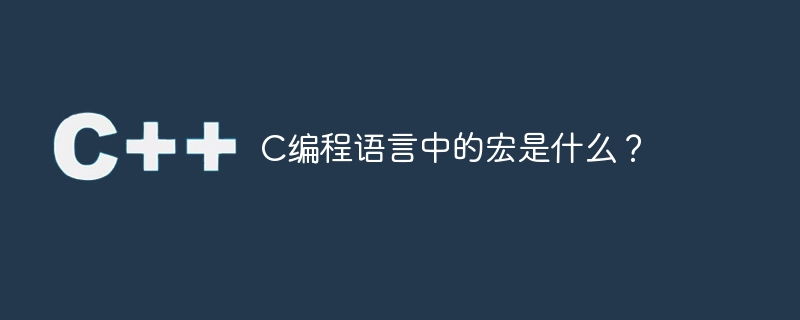C编程语言中的宏是什么?

宏替换是一种提供字符串替换的机制。它可以通过"#define"实现。
在程序执行之前,它用于将宏定义的第一部分替换为第二部分。
第一个对象可以是函数类型或对象。
语法
宏的语法如下:
#define first_part second_part
程序
在程序中,每次出现first_part都会被替换为second_part。
在线演示
#include<stdio.h>
#define square(a) a*a
int main(){
int b,c;
printf("enter b element:");
scanf("%d",&b);
c=square(b);//replaces c=b*b before execution of program
printf("%d",c);
return 0;
}输出
您将看到以下输出 −
enter b element:4 16
考虑另一个解释宏功能的程序。
实时演示
#include<stdio.h>
#define equation (a*b)+c
int main(){
int a,b,c,d;
printf("enter a,b,c elements:");
scanf("%d %d %d",&a,&b,&c);
d=equation;//replaces d=(a*b)+c before execution of program
printf("%d",d);
return 0;
}输出
您将看到以下输出 −
enter a,b,c elements: 4 7 9 37
以上是C编程语言中的宏是什么?的详细内容。更多信息请关注PHP中文网其他相关文章!

热AI工具

Undresser.AI Undress
人工智能驱动的应用程序,用于创建逼真的裸体照片

AI Clothes Remover
用于从照片中去除衣服的在线人工智能工具。

Undress AI Tool
免费脱衣服图片

Clothoff.io
AI脱衣机

AI Hentai Generator
免费生成ai无尽的。

热门文章

热工具

记事本++7.3.1
好用且免费的代码编辑器

SublimeText3汉化版
中文版,非常好用

禅工作室 13.0.1
功能强大的PHP集成开发环境

Dreamweaver CS6
视觉化网页开发工具

SublimeText3 Mac版
神级代码编辑软件(SublimeText3)

热门话题
 Golang代码优化:宏定义的作用与实践
Feb 29, 2024 pm 12:42 PM
Golang代码优化:宏定义的作用与实践
Feb 29, 2024 pm 12:42 PM
标题:Golang代码优化:宏定义的作用与实践在Golang中,宏定义是一种方便的代码优化工具,它可以在编译时对代码进行替换,减少代码重复、提高代码可读性和维护性。本文将介绍宏定义的作用、实践方法,并通过具体的代码示例来说明如何在Golang中使用宏定义进行代码优化。什么是宏定义?宏定义是一个在编译时进行替换操作的预处理指令,在Golang中使用gogen
 通过使用pandas来探讨数据清洗和预处理的技巧
Jan 13, 2024 pm 12:49 PM
通过使用pandas来探讨数据清洗和预处理的技巧
Jan 13, 2024 pm 12:49 PM
利用pandas进行数据清洗和预处理的方法探讨引言:在数据分析和机器学习中,数据的清洗和预处理是非常重要的步骤。而pandas作为Python中一个强大的数据处理库,具有丰富的功能和灵活的操作,能够帮助我们高效地进行数据清洗和预处理。本文将探讨几种常用的pandas方法,并提供相应的代码示例。一、数据读取首先,我们需要读取数据文件。pandas提供了许多函数
 golang函数的宏定义
Apr 29, 2024 pm 03:06 PM
golang函数的宏定义
Apr 29, 2024 pm 03:06 PM
Go语言中的函数宏定义允许将函数指针存储在常量中,实现提前绑定函数调用,增强代码可读性和可维护性。具体步骤如下:使用const关键字定义宏,指定宏名、参数列表和返回值类型。在函数宏中编写函数体。通过宏名调用函数宏。函数宏可用于各种场景,如文件内容比较。
 PHP扩展开发:如何通过宏定义自定义函数的行为?
Jun 05, 2024 pm 01:41 PM
PHP扩展开发:如何通过宏定义自定义函数的行为?
Jun 05, 2024 pm 01:41 PM
通过宏定义可以定制PHP扩展中自定义函数的行为,具体方法包括:禁用函数、更改返回值、添加前置或后置操作。例如,通过宏定义禁用exit()函数、将rand()函数的返回值始终设置为10、为file_get_contents()函数添加计时记录,以增强函数功能,创建更灵活强大的PHP脚本。
 使用Java实现的数据清洗和预处理技术
Jun 18, 2023 pm 01:45 PM
使用Java实现的数据清洗和预处理技术
Jun 18, 2023 pm 01:45 PM
随着数据的普及和使用,数据的质量问题也日益受到关注。数据清洗和预处理是提高数据质量的关键技术之一。使用Java实现的数据清洗和预处理技术可以有效地提高数据质量,使得数据分析结果更加准确和可靠。一、数据清洗技术数据清洗是指对数据中存在的错误、不完整、重复或者无效的数据进行处理,以便更好地进行后续的数据分析和挖掘。Java提供了丰富的工具和库,可以帮助我们实现数
 深入探讨:Golang是否支持宏定义?
Mar 01, 2024 am 08:36 AM
深入探讨:Golang是否支持宏定义?
Mar 01, 2024 am 08:36 AM
Golang是否支持宏定义?Golang作为一种静态类型、并发支持、编译型的编程语言,其简洁的语法和高效的性能使其在互联网行业广受欢迎。然而,有些开发者可能会疑惑,Golang是否支持宏定义这一在一些其他编程语言中常见的特性呢?本文将深入探讨这个问题,并结合具体的代码示例进行分析。宏定义在一些编程语言中被广泛应用,可以通过宏来实现代码复用、简化代码、提高代码
 PHP避免SQL注入的方法是什么?
Jun 30, 2023 am 09:57 AM
PHP避免SQL注入的方法是什么?
Jun 30, 2023 am 09:57 AM
如何处理PHP的SQL注入问题?近年来,随着互联网的迅猛发展,网站和应用程序的数量不断增加,其中一种常见的开发语言是PHP。然而,PHP的使用也引发了一些安全问题,其中之一就是SQL注入。SQL注入攻击是指黑客通过构造恶意的SQL语句来获取、修改或破坏数据库中的数据。为了保护网站和应用程序的安全,开发人员需要采取一些措施来防止SQL注入漏洞的出现。首先,开发
 C程序用宏函数计算销售员的工资
Sep 10, 2023 pm 06:13 PM
C程序用宏函数计算销售员的工资
Sep 10, 2023 pm 06:13 PM
问题一家笔记本电脑制造公司对其销售人员的月度薪酬政策如下-最低基本工资:3000.00奖金每售出一台电脑:200.00每月总销售额的佣金:5%由于笔记本电脑的价格不断变化,每台笔记本电脑的销售价格在月初是固定的每个月。解决方案查找奖金和佣金的逻辑如下-bonus=BONUS_RATE*quantity;commission=COMMISSION*quantity*price;总工资是使用下面给出的公式计算的-Grosssalary=basicsalary+(quantity*bonusrate)






